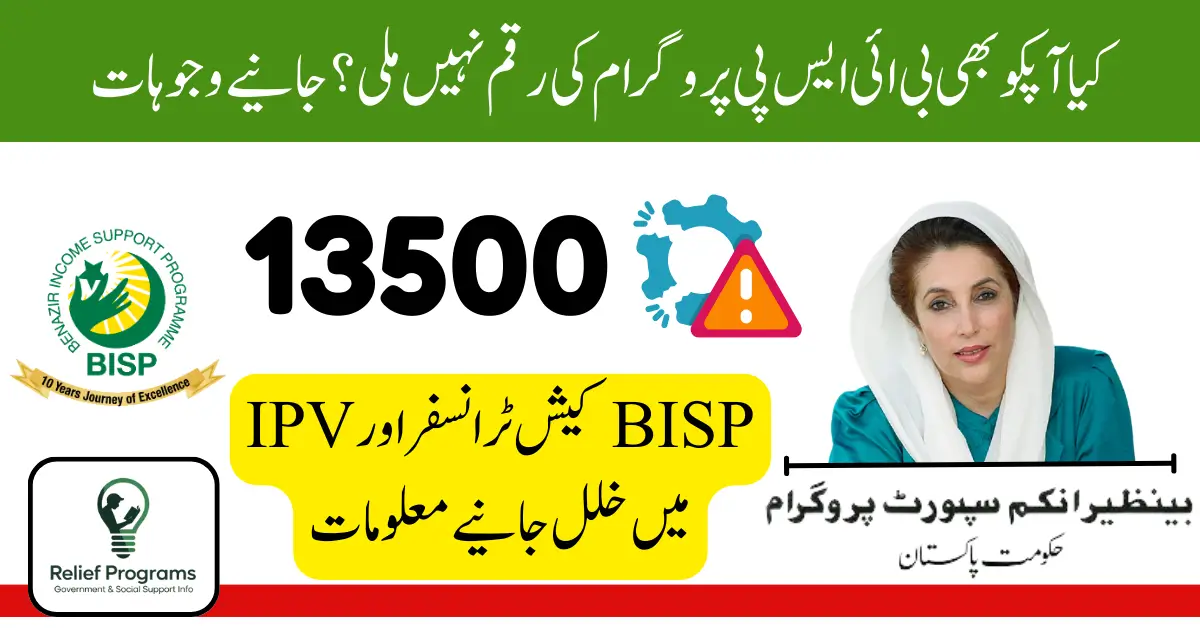BISP Cash Transfers are a critical source of income for millions of low-income families across Pakistan. In 2025, the disruption of the Income Proxy Verification (IPV) system led to a temporary halt in payments, triggering serious social and economic consequences. Designed to support the most vulnerable, the sudden failure of this digital infrastructure highlighted deep flaws in the way welfare systems are managed.

For families who rely on monthly assistance, this breakdown was more than an inconvenience—it was a survival crisis. Without access to BISP Cash Transfers, many households were forced to borrow, reduce meals, or pull children out of school. The disruption revealed how fragile livelihoods have become, particularly in regions already under economic stress.
For More Information: Ehsaas Program 8171 New Update – CNIC Check
BISP Cash Transfers & IPV Disruption
IPV is a data-driven tool used to assess eligibility for welfare programs. It eliminates the need for paperwork and aims to create faster decisions through algorithms. However, in 2025, this system failed to process or verify thousands of cases, excluding legitimate recipients from their entitled support. This technical collapse left many helpless, unable to challenge or resolve the issue on time.
2025 میں پاکستان کے فلاحی نظام میں ایک بڑی رکاوٹ آئی، جس نے ہزاروں خاندانوں کو مالی بحران میں ڈال دیا۔ یہ رکاوٹ ایک ڈیجیٹل نظام میں خرابی کی وجہ سے پیدا ہوئی، جس پر غربت کے شکار لوگ مکمل طور پر انحصار کر رہے تھے۔
Program Overview
| Key Area | Details |
| Focus Issue | Disruption in IPV affected BISP payments |
| Affected Populations | Low-income families, especially in rural areas |
| Public Reaction | Protests, civil activism, and emergency assistance |
| Economic Impact | Local markets saw reduced activity due to drop in household cash flow |
| Gendered Consequences | Women faced greater pressure due to disrupted cash support |
| Root Cause | Overdependence on digital verification without human alternatives |
| Future Solutions | Hybrid systems, training, and better real-time support mechanisms |
Real-Life Consequences for Households
As BISP Cash Transfers were delayed or blocked, households quickly began to feel the effects. School fees went unpaid, healthcare appointments were canceled, and families skipped meals to make ends meet. For people already living under the poverty line, even a single missed payment can unravel stability built over months.
For More Information: BISP September 2025 Update New Registration Phase Open
Public Reaction and Grassroots Mobilization
Communities didn’t sit in silence. Protests erupted across various cities and towns as people demanded answers and action. Local non-profits and community leaders stepped in to support those hit hardest, offering temporary relief and helping people understand what went wrong.
- Protests took place in Hyderabad, Bahawalpur, and Peshawar
- Civil society groups raised formal concerns to policymakers
- Emergency food and cash aid was distributed locally in select areas
How Trust Was Eroded
When digital systems fail, the damage is not only operational—it’s emotional and psychological. Families who depend on BISP Cash Transfers felt ignored and powerless. Rumors and misinformation filled the gap left by poor official communication, deepening public mistrust in government-run welfare initiatives.
For More Information: BISP 8171 Portal – New Update for Applicants
اس بحران کے بعد کئی علاقوں میں مظاہرے دیکھنے میں آئے، جہاں لوگ اپنے حق کے لیے آواز بلند کرتے نظر آئے۔ مقامی تنظیمیں اور کارکنان عوام کی مدد کے لیے میدان میں نکل آئے تاکہ مستحق افراد کو وقتی امداد فراہم کی جا سکے۔
Economic Ripple Effects in Local Markets
The absence of regular BISP Cash Transfers also hurt small local businesses. When families had less money to spend, shopkeepers saw sales drop. From corner stores to local transport providers, entire micro-economies were affected in rural and semi-urban regions that typically rely on these payments.
Women Bear the Heaviest Burden
Because most BISP payments are registered under women’s names, the disruption had a gendered impact. Women were often blamed by their families for the missing income, despite having no control over the situation. Many had to borrow at high interest rates just to feed their children, deepening household debt.
For More Information: 8171 Web Portal September 2025 Update – New Features
The Weak Link in Digital Welfare
Digital systems can enhance welfare—but only when backed by support structures. The 2025 IPV failure showed how dangerous it is to rely solely on tech without human intervention. Beneficiaries had nowhere to go and no one to contact, leaving them stuck in bureaucratic limbo.
خاص طور پر خواتین نے اس مشکل وقت میں سب سے زیادہ مشکلات کا سامنا کیا۔ مالی معاونت کے بغیر انہیں روزمرہ کے اخراجات، بچوں کی تعلیم اور علاج معالجہ جیسے اہم معاملات پر سخت فیصلے کرنے پڑے۔
Lessons for Policymakers
The crisis has forced a conversation around the future of social protection in Pakistan. Some important changes should include:
- A hybrid eligibility process combining digital and manual verification
- Better staff training and public communication systems
- A responsive helpline or field network for issue resolution
For More Information: BISP 8171 New Districts September 2025 – Full List
The Path Forward Requires More Than Technology
BISP Cash Transfers are more than just financial aid—they are lifelines that carry dignity, opportunity, and hope. Moving forward, reforms must include transparency, empathy, and contingency planning. Only then can Pakistan build a welfare system that earns and maintains the trust of its people.
Conclusion
The disruption of BISP Cash Transfers in 2025 was more than a system failure—it was a wake-up call. It exposed the heavy dependence of millions on timely financial support and the risks of relying solely on digital tools without adequate backup. While the government’s response showed some effort to address the crisis, the damage to public trust and everyday livelihoods was already done.
